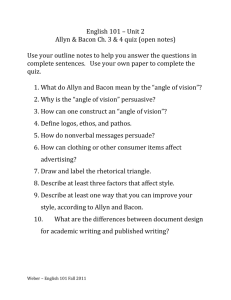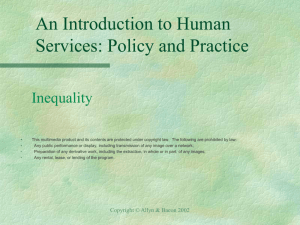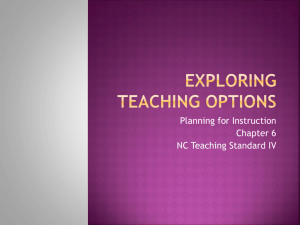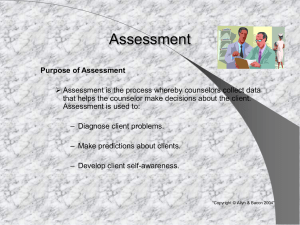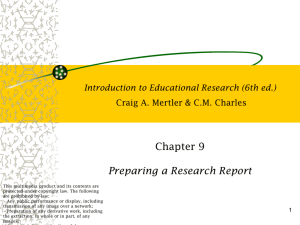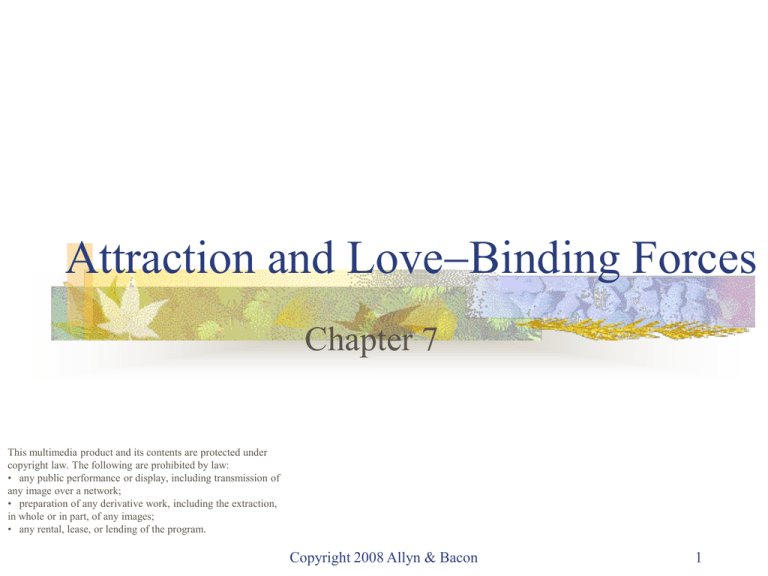
Attraction and LoveBinding Forces
Chapter 7
This multimedia product and its contents are protected under
copyright law. The following are prohibited by law:
• any public performance or display, including transmission of
any image over a network;
• preparation of any derivative work, including the extraction,
in whole or in part, of any images;
• any rental, lease, or lending of the program.
Copyright 2008 Allyn & Bacon
1
Attraction and Love
Attraction: The Force That Binds?
Love: “The Morning and the Evening Star”?
Copyright 2008 Allyn & Bacon
2
Attraction: The Force That Binds?
Physical Attractiveness
Is beauty in the eye of the beholder?
Cultural standards for physical attractiveness exist.
Can lead to taking measures to meet cultural expectations
Anorexia nervosa: Potentially life-threatening eating
disorder characterized by refusal to maintain a healthy body
weight; intense fear of being overweight; a distorted body
image; and, in females, lack of menstruation (amenorrhea).
Men prefer women to be somewhat heavier than women think
men do.
Women prefer men to be somewhat leaner than men think
women do.
Copyright 2008 Allyn & Bacon
3
Attraction: The Force That Binds?
Lesbians’ physical preferences:
Prefer heavier women than men
Reject excessive slenderness as attractive
Nonphysical traits
Perceived beauty may be enhanced by such
traits as familiarity, liking, respect, and
sharing of values and goals
Copyright 2008 Allyn & Bacon
4
Attraction: The Force That Binds?
Some facial features associated with beauty appear
to be the same across cultures.
Gender-role expectations affect perceptions of
physical attractiveness.
People who act consistent with gender-role
expectations typically are viewed as more attractive.
People’s names affect perceptions of attractiveness.
Matthew versus Sylvester
Christine versus Gertrude
Copyright 2008 Allyn & Bacon
5
Attraction: The Force That Binds?
Men report valuing the physical attractiveness of
prospective partners more than women do.
Women report valuing the earning potential of
prospective partners more than men do.
Although some evidence may support an evolutionary
explanation for attractiveness preferences, it does not fit all
the data.
Both men and women report that personal characteristics (e.g.,
honesty) matter more than physical features do when considering
long-term partners.
And many women also prefer physically attractive partners.
Cultural influences can explain the findings, as well.
Copyright 2008 Allyn & Bacon
6
Attraction: The Force That Binds?
Attraction-Similarity Hypothesis
People tend to develop romantic relationships
with people who are similar to themselves in
attractiveness and other traits.
Exceptions to this hypothesis happen when a lack
of attractiveness is compensated for by other
factors.
Matching can apply to similarity in ethnicity,
age, educational level, and religion.
Copyright 2008 Allyn & Bacon
7
Attraction: The Force That Binds?
Attitudes: Do “Opposites Attract” or Do “Birds of
a Feather Flock Together”?
Similarity in attitudes is an important factor in
attraction.
Propinquity (nearness) – we tend to live near those
who are similar to us in many ways
Similarity is more important to women than to men
Reciprocity
Mutual exchange
People like those who they think like them.
Copyright 2008 Allyn & Bacon
8
Love: “The Morning and the
Evening Star”?
The Greek Heritage
The ancient Greeks identified four types of
love.
Storge
Loving attachment and nonsexual affection
The type of love that binds parents to children
Agape
Selfless love
A kind of loving that is similar to generosity and charity
Copyright 2008 Allyn & Bacon
9
Love: “The Morning and the
Evening Star”?
4 types of love (cont’d)
Philia
Friendship love
Based on liking and respect rather than sexual desire
Eros
The kind of love that is closest in meaning to the modernday concept of passion
Copyright 2008 Allyn & Bacon
10
Love: “The Morning and the
Evening Star”?
Romantic Love in Contemporary Western
Culture
Western culture idealizes the concept of
romantic love.
In the U.S., most people believe romantic love is a
prerequisite for marriage or other kinds of long-term
or permanent relationships.
Romantic love involves emotional highs and lows.
Women justify sexual activity with love, but men do
not need to attribute love to sexual urges and behavior
Copyright 2008 Allyn & Bacon
11
Love: “The Morning and the
Evening Star”?
Infatuation
A state of intense absorption in or focus on another
person
Usually involves sexual desire, elation, general
physiological arousal or excitement; passion
If relationship develops, it typically is enforced by
feelings of attachment and caring.
Often a passing fancy, but may develop into deeper
feelings and an enduring relationship
Copyright 2008 Allyn & Bacon
12
Love: “The Morning and the
Evening Star”?
Biological mechanisms:
Bodily changes occur when we feel love:
Chemicals in the brain’s pleasure system
Hormones
Increased nerve growth factor
Copyright 2008 Allyn & Bacon
13
Love: “The Morning and the
Evening Star”?
Contemporary Models of Love
Love as appraisal of arousal (Berscheid &
Hatfield)
Romantic love
A kind of love characterized by feelings of passion and
intimacy
Physiological arousal that is attributed to feelings of
love
Culture that idealizes romantic love
Copyright 2008 Allyn & Bacon
14
Love: “The Morning and the
Evening Star”?
Styles of love (Hendrick & Hendrick)
Romantic love (eros)
Game-playing love (ludus)
“My lover and I were attracted to each other
immediately.”
“I get over love affairs pretty easily.”
Friendship (storge, philia)
“The best love grows out of an enduring
friendship.”
Copyright 2008 Allyn & Bacon
15
Love: “The Morning and the
Evening Star”?
Styles of love (Hendrick & Hendrick)
Logical love (pragma)
Possessive, excited love (mania)
“I consider a lover’s potential in life before
committing myself.”
“When my lover ignores me, I get sick all over.”
Selfless love (agape)
“My lover’s needs and wishes are more important
than my own.”
Copyright 2008 Allyn & Bacon
16
Love: “The Morning and the
Evening Star”?
Sternberg’s triangular theory of love
Three main components of loving relationships
Intimacy
Passion
Feelings of closeness, bondedness, and connectedness
Desire to share one’s innermost thoughts with the other
Desire to give and receive emotional support
Intense romantic or sexual desire for another person, which is
accompanied by physiological arousal
Commitment
Commitment to maintain the relationship despite potential
hardships
Copyright 2008 Allyn & Bacon
17
Love: “The Morning and the
Evening Star”?
Sternberg’s triangular theory of love
Intimacy
Passion
Commitment
Copyright 2008 Allyn & Bacon
18
Love: “The Morning and the
Evening Star”?
Sternberg’s triangular theory of love
Types of love
Nonlove
Liking
All components of love are absent.
Intimacy is present.
Passion and commitment are absent.
Friendship love
Infatuation
“Love at first sight”
Passion is present.
Intimacy and commitment are absent.
Copyright 2008 Allyn & Bacon
19
Love: “The Morning and the
Evening Star”?
Sternberg’s triangular theory of love
Types of love
Empty love
Romantic love
Commitment is present.
Passion and intimacy are absent.
Passion and intimacy are present.
Commitment is absent.
Companionate love
Intimacy and commitment are present.
Passion is absent.
Copyright 2008 Allyn & Bacon
20
Love: “The Morning and the
Evening Star”?
Sternberg’s triangular theory of love
Types of love
Fatuous love
Passion and commitment are present.
Intimacy is absent.
Consummate love
Full or complete measure of love
Combination of passion, intimacy, and commitment
An ideal type of love
Harder to maintain than to achieve
Copyright 2008 Allyn & Bacon
21
Love: “The Morning and the
Evening Star”?
Sternberg’s triangular theory of love
Liking
Intimacy
Romantic
Love
Passion
Infatuation
Companionate
Love
Consummate
Love
Commitment
Fatuous
Love
Copyright 2008 Allyn & Bacon
Empty Love
22

